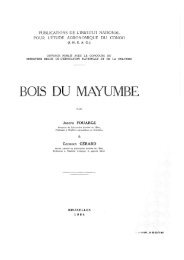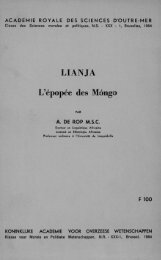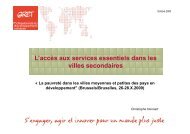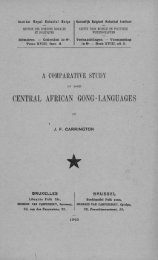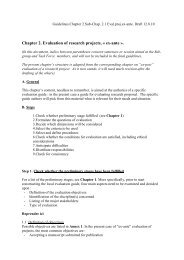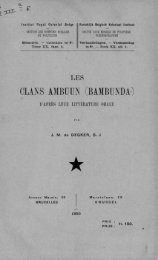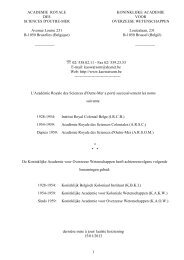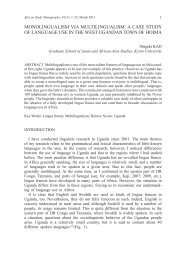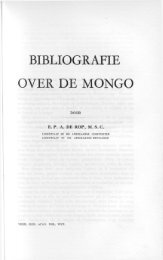(1986) n°2 - Royal Academy for Overseas Sciences
(1986) n°2 - Royal Academy for Overseas Sciences
(1986) n°2 - Royal Academy for Overseas Sciences
You also want an ePaper? Increase the reach of your titles
YUMPU automatically turns print PDFs into web optimized ePapers that Google loves.
- 142 —<br />
voor de Islam te behouden. 1985 vangt aan met de afzetting van maarschalk-voorzitter<br />
Nimeiri, die aan de «Musulmaanse Broeders» privileges verschafte na ze te hebben vervolgd.<br />
Aan zijn opvolger, generaal Suwar-el-Dahab, liet hij een schuld na van negen miljard dollar<br />
en de vijandigheid veroorzaakt door overdreven sympathieën ten overstaan van de Verenigde<br />
Staten. Suwar roept de niet-gebondenheid uit en steekt tevergeefs de hand uit naar de rebellen<br />
van het Zuiden. Er ontstond wat men toen de «hongersnood» noemde ; in werkelijkheid was<br />
het echter het binnenvallen in het Oosten van een miljoen Ethiopische vluchtelingen en van<br />
een half miljoen diverse geëvacueerden in Darfour in het Westen. Sinds november 1984 werd<br />
de wereld geschokt door de hongersnood in Ethiopië, waar de hulp toestroomde, maar men<br />
moet tot april 1985 wachten opdat Soedan de aandacht zou krijgen die het verdiende. De<br />
hulpagentschappen vermenigvuldigden zich zonder hun aktie te coördineren en de eerste<br />
regens waren rampzalig : banen en spoorwegen werden verwoest. 1985 zal tot ver over de<br />
grenzen gekenmerkt blijven door de noodzaak aan de bewustwording inzake de «ontwikkeling»,<br />
niettegenstaande zekere verwezenlijkingen belovenswaardig lijken.<br />
S u m m a r y . — Sudan, one hundred years later, 1885-1985. — Khartoum was founded in 1820,<br />
by Turco-Egyptians, but since that time, the Sudan called <strong>for</strong> some general and sustained<br />
attention in 1885 and in 1985 only. 1885 was the year Khartoum fell to the “Mahdi”, Gordon<br />
died, and the “Mahdi” himself, succeeded by the “Khalifa”. History has been unfair to this<br />
man. He ran the country during more than thirteen years, in spite of uninterrupted attacks,<br />
and gave it a metropolis, Omdurman, still the largest agglomeration of Sudan, and a decisive<br />
factor in keeping <strong>for</strong> Islam the largest country in Africa. 1985 started with the dismissal of<br />
field-marshall-president Nimeiri, who had granted his favours to the “Muslim Brothers”, after<br />
persecuting them. He left to his successor, General Suwar-el-Dahab, a debt of nine billion<br />
dollars and the hostility bred by his excessive sympathy towards the United States. Suwar<br />
proclaimed his non-alignment and tendered vainly his hand to the Southern rebels. Then came<br />
what was described as “famine”, actually the irruption of one million Ethiopian refugees in the<br />
East and one-half million displaced persons of several kinds in Darfour, in the West. Since<br />
November 1984, the whole world has been alerted to famine in Ethiopia, whereto generous<br />
help was sent, but we have to wait until April 1985 be<strong>for</strong>e seeing the Sudan receiving the<br />
attention it deserves. Aid agencies then became numerous but there was no co-ordinated<br />
action from their part, and disaster took place when the first rains obstructed roads and railway<br />
tracks. 1985 will be remembered, and not in the Sudan alone, as showing the necessity of<br />
self-examination regarding “development”, though some achievements show promises of<br />
punctual successes.<br />
*<br />
* *<br />
26 janvier 1885 (8 Rabi’ al-Thani 1303 de l’Hègiré) : le jour le plus long de toute<br />
l’Histoire du Soudan. Les Ansar envahissent Khartoum, décapitent Gordon Pacha,<br />
un nouvel État est né, il vivra plus de treize ans mais nul ne le reconnaîtra jamais.<br />
Le Mahdi lui-même ne séjournera pas longtemps dans cette capitale d’origine<br />
impure. Il repassera donc le Nil Blanc, pour s’installer à Omdurman et y mourir dès<br />
le 22 juin suivant.<br />
Ce n’est donc pas au Mahdi, mais au successeur désigné par lui, le Khalifa, qu’il<br />
convient d’attribuer tout le mal qu’on s’est plu à dire de l’État mahdiste, de même




